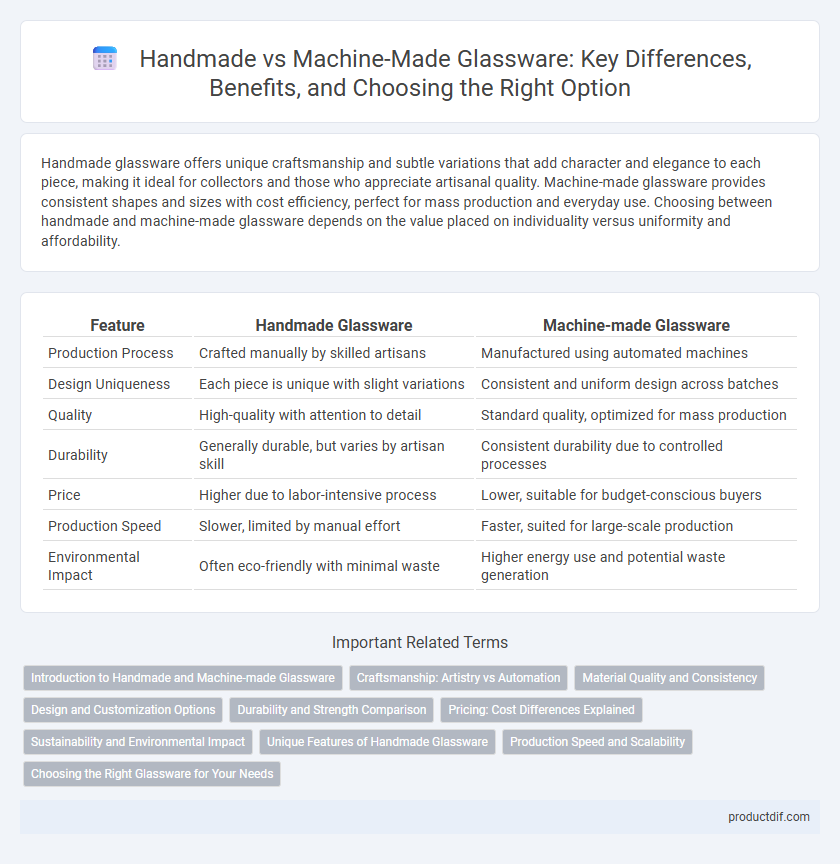Handmade glassware offers unique craftsmanship and subtle variations that add character and elegance to each piece, making it ideal for collectors and those who appreciate artisanal quality. Machine-made glassware provides consistent shapes and sizes with cost efficiency, perfect for mass production and everyday use. Choosing between handmade and machine-made glassware depends on the value placed on individuality versus uniformity and affordability.
Table of Comparison
| Feature | Handmade Glassware | Machine-made Glassware |
|---|---|---|
| Production Process | Crafted manually by skilled artisans | Manufactured using automated machines |
| Design Uniqueness | Each piece is unique with slight variations | Consistent and uniform design across batches |
| Quality | High-quality with attention to detail | Standard quality, optimized for mass production |
| Durability | Generally durable, but varies by artisan skill | Consistent durability due to controlled processes |
| Price | Higher due to labor-intensive process | Lower, suitable for budget-conscious buyers |
| Production Speed | Slower, limited by manual effort | Faster, suited for large-scale production |
| Environmental Impact | Often eco-friendly with minimal waste | Higher energy use and potential waste generation |
Introduction to Handmade and Machine-made Glassware
Handmade glassware is crafted by skilled artisans using traditional techniques such as blowing and molding, resulting in unique pieces with subtle variations and intricate details. Machine-made glassware is produced through automated processes that allow for high-volume manufacturing with consistent shapes and uniform quality. Both methods offer distinct advantages, with handmade glassware prized for its artistry and machine-made glassware favored for affordability and precision.
Craftsmanship: Artistry vs Automation
Handmade glassware showcases unparalleled craftsmanship, with artisans meticulously shaping each piece to create unique, intricate designs that reflect individual artistry. Machine-made glassware relies on automation, producing uniform items with consistency and efficiency but lacking the subtle nuances and character found in handcrafted counterparts. The distinct value of handmade glass lies in its artistic expression and skill, whereas machine-made glass emphasizes scalability and precision.
Material Quality and Consistency
Handmade glassware often features superior material quality due to the careful selection of raw materials and artisanal techniques, resulting in unique, high-grade products with slight variations. Machine-made glassware ensures greater consistency and uniformity in thickness and clarity, produced through automated processes that minimize defects. While handmade glass excels in craftsmanship and individuality, machine-made glass offers reliable quality control and scalability.
Design and Customization Options
Handmade glassware offers unique design intricacies and personalized customization options that machine-made glassware typically cannot replicate, providing one-of-a-kind pieces crafted by skilled artisans. Machine-made glassware excels in consistency, uniformity, and mass production efficiency but often lacks the detailed artistry and bespoke design variations possible with handmade items. Consumers seeking exclusive designs and tailored aesthetics prefer handmade glassware, while those prioritizing affordability and standardization opt for machine-made alternatives.
Durability and Strength Comparison
Handmade glassware typically exhibits unique strength variations due to artisan techniques and controlled cooling processes, resulting in thicker, more resilient pieces compared to uniform but thinner machine-made glassware. Machine-made glassware benefits from precise manufacturing standards that ensure consistent durability, though it may lack the structural reinforcement found in handcrafted items. Both types balance durability and strength differently, with handmade glassware often preferred for sturdiness in artisanal collections, while machine-made glassware suits high-volume, standardized applications.
Pricing: Cost Differences Explained
Handmade glassware typically commands higher prices due to the labor-intensive craftsmanship and unique variations in each piece, reflecting artisanal skill and limited production. Machine-made glassware benefits from mass production efficiency, resulting in lower costs and uniform quality, making it more affordable for everyday use. Price differences also stem from raw material usage, with handmade pieces often utilizing higher-quality glass and intricate designs that increase manufacturing expenses.
Sustainability and Environmental Impact
Handmade glassware typically has a lower environmental footprint due to the use of traditional methods that require less energy and produce minimal waste compared to machine-made glassware, which relies heavily on automated processes consuming large amounts of electricity and generating significant industrial waste. Artisanal production also emphasizes the use of recycled glass materials, enhancing sustainability through resource conservation. Machine-made glassware, while efficient in mass production, often involves high-carbon emissions and extensive packaging, raising concerns about its long-term environmental impact.
Unique Features of Handmade Glassware
Handmade glassware showcases unique characteristics such as slight variations in shape and thickness, emphasizing its artisanal craftsmanship and exclusivity. Each piece embodies individual artistry, often featuring intricate details and subtle imperfections that machine-made glassware cannot replicate. These qualities contribute to its higher aesthetic and collectible value in comparison to uniform, mass-produced items.
Production Speed and Scalability
Handmade glassware offers unique designs and craftsmanship but has slower production speeds, limiting scalability for large orders. Machine-made glassware significantly increases production speed through automation, enabling mass production to meet high demand efficiently. This scalability makes machine-made glassware ideal for commercial markets requiring consistent quality and volume.
Choosing the Right Glassware for Your Needs
Handmade glassware offers unique designs and slight variations that enhance its artistic value, making it ideal for collectors and those seeking personalized pieces. Machine-made glassware provides consistency, durability, and affordability, suiting everyday use and large-scale needs. Selecting the right glassware depends on balancing aesthetic preferences, usage frequency, and budget considerations.
Handmade Glassware vs Machine-made Glassware Infographic

 productdif.com
productdif.com